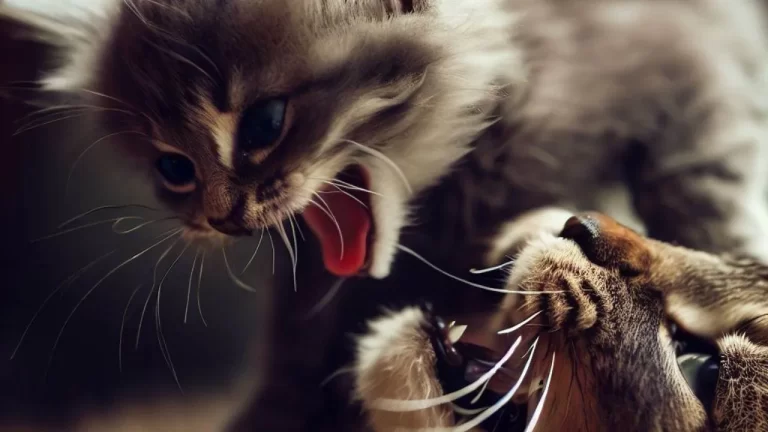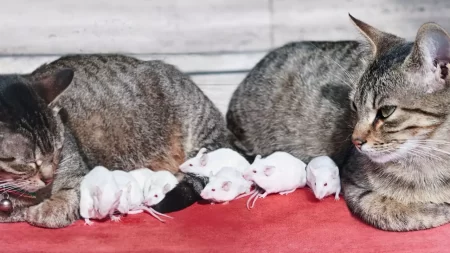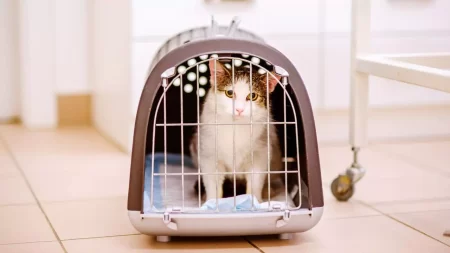For individuals who are dealing with a new kitten and an established older cat at home, there may be concerns about the kitten’s aggressive behavior toward the older cat. Kittens, while brimming with energy and playfulness, may often disturb older, more composed and territorial cats.
This article delves into why kittens display such aggression, identifies certain breeds with a higher tendency towards this behavior, and demonstrates the beneficial effects of spaying or neutering.
Further, strategies on peaceful introductions, establishing clear boundaries, and creating an enriching environment for the kitten will be provided, along with methods to keep the peace when disagreements arise between the cats.
Causes of Kitten Aggression
Kittens attack older cats for various reasons, such as:
- Fear: Some kittens may be afraid of unfamiliar things or situations, such as a new home, a new cat, or loud noises. They may attack the older cat as a way of defending themselves or showing their dominance.
- Curiosity: Kittens are curious and want to explore everything around them. They may attack the older cat as a way of inviting them to play or learning more about them.
- Protecting territory: Kittens may have a natural instinct to protect their surrounding environment from intruders or competitors. They may attack the older cat if they feel that their food, toys, litter box, or sleeping spot are threatened.
- Hunting and stalking instincts: Kittens have a strong drive to hunt and stalk prey. They may attack the older cat as a way of practicing their skills or satisfying their urge.
- Play aggression: Kittens love to play and sometimes they can get too rough or excited. They may bite, scratch, or pounce on the older cat without realizing that they are hurting them or annoying them.
Are there any breeds of cats that are more prone to kitten aggression?
Some breeds of cats are more energetic, active, and playful than others. These breeds may be more likely to attack older cats because they need more stimulation and interaction. Some examples of these breeds are:
- Abyssinian
- Bengal
- Maine Coon
- Siamese
- Turkish Angora
However, this does not mean that all cats of these breeds are aggressive or that other breeds are not. Each cat has its own personality and temperament that can be influenced by many factors, such as genetics, environment, socialization, training, health, etc.
Can spaying or neutering your kitten help reduce their attacking behavior?
Spaying or neutering your kitten can help reduce their attacking behavior by lowering their hormones and reducing their sexual urges. This can make them less aggressive, territorial, and restless. It can also prevent unwanted pregnancies and reduce the risk of certain diseases and cancers.
Spaying or neutering your kitten can be done as early as 8 weeks of age or as late as 6 months of age. Consult your veterinarian for the best time to spay or neuter your kitten.
What are the best ways to separate your kitten and older cat if they fight?
If your kitten and older cat fight frequently or violently, you may need to separate them for a while until they calm down and get used to each other. Here are some ways to separate them:
- Put them in different rooms with their own food, water, litter box, toys, bed, etc.
- Use a baby gate or a screen door to divide a room into two sections.
- Use a crate or a carrier to confine one of them temporarily.
- Use a spray bottle filled with water to squirt them if they start fighting.
- Use a loud noise maker such as a whistle or a clap to distract them if they start fighting.
Never use physical force or punishment to separate them or stop them from fighting. This can make them more fearful or aggressive towards you and each other.
How To Introduce A Kitten To An Older Cat?
The best way to introduce a kitten to an older cat is to do it gradually and carefully. Here are some steps you can follow:
- Before bringing the kitten home, get some items that have the scent of the older cat on them, such as a blanket or a toy. Put these items near the kitten so that it can get familiar with the smell of the older cat.
- When you bring the kitten home, keep it in a separate room with its own food, water, litter box, toys, bed, etc. Let the older cat sniff the door of the room and hear the sounds of the kitten. Do this for a few days until both cats seem relaxed and curious.
- Next, swap the items and the rooms of the cats. Let the kitten explore the rest of the house while the older cat stays in the kitten’s room. This will allow them to get used to each other’s scent and territory. Do this for a few days until both cats seem comfortable and confident.
- Then, introduce the cats face to face-through a barrier, such as a baby gate or a screen door. Let them see and smell each other without direct contact. Give them treats and praise when they behave calmly and friendly. Do this for a few days until both cats seem interested and friendly.
- Finally, introduce the cats without a barrier, but under your supervision. Let them interact freely but watch them closely for any signs of aggression or fear. If they start fighting, separate them immediately and go back to the previous step. If they get along well, reward them with treats and praise. Do this for a few days until both cats seem relaxed and happy.
How To Establish Boundaries And Rules For Your Kitten?
To prevent your kitten from attacking your older cat, you need to establish some boundaries and rules for your kitten. Here are some tips:
- Teach your kitten to play gently with your older cat. If your kitten bites or scratches too hard, say “no” firmly and stop playing with it. Redirect its attention to a toy or another activity.
- Provide your kitten with appropriate toys that can satisfy its hunting and stalking instincts. Avoid using your hands or feet as toys as this can encourage biting and scratching.
- Play with your kitten regularly and give it enough attention and affection. A bored or lonely kitten may attack your older cat to get attention or entertainment.
- Respect your older cat’s space and preferences. If your older cat wants to be left alone or doesn’t want to share its food, toys, litter box, or bed, don’t force it to interact with your kitten. Give your older cat some areas where it can escape from your kitten if it needs to.
How To Provide Enough Stimulation And Enrichment For Your Kitten?
To keep your kitten happy and healthy, you need to provide it with enough stimulation and enrichment. This can help reduce its aggression towards your older cat by keeping it busy and satisfied. Here are some ideas:
- Provide your kitten with a variety of toys that can stimulate its senses and challenge its mind. Rotate the toys regularly to keep them interesting and exciting.
- Provide your kitten with a scratching post or a pad that can allow it to sharpen its claws and mark its territory.
- Provide your kitten with a cat tree or a perch that can allow it to climb, jump, and survey its surroundings.
- Provide your kitten with a window view or a bird feeder that can allow it to watch the outside world and satisfy its curiosity.
- Provide your kitten with some catnip or some interactive toys that can make it happy and playful.
Conclusion
Kittens are adorable and fun, but they can also be troublesome and aggressive to older cats.
To stop your kitten from attacking your older cat, you need to understand the causes of their behavior, spay or neuter them if possible, separate them if they fight, introduce them properly, establish boundaries and rules for them, and provide enough stimulation and enrichment for them.
With patience and consistency, you can help your kitten and older cat get along well and live peacefully together.







